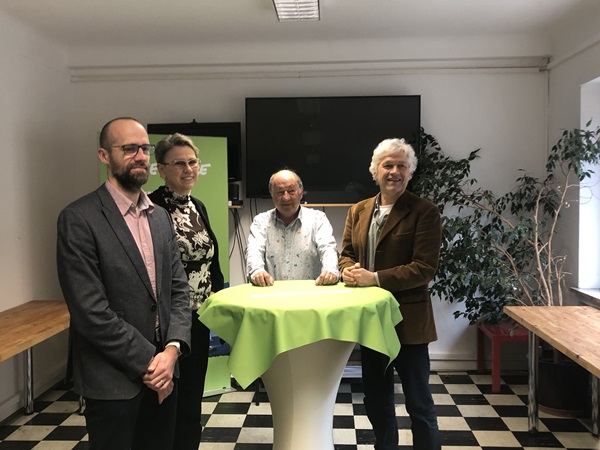 Frédéric Meys, Let’s Rebuild Tomorrow campaign; Martina Holbach, sustainable finance campaign; Roger Spautz, nuclear campaign; Raymond Aendekerk, agriculture referent and Director of Greenpeace Luxembourg;
Credit: Otilia Dragan/Chronicle.lu
Frédéric Meys, Let’s Rebuild Tomorrow campaign; Martina Holbach, sustainable finance campaign; Roger Spautz, nuclear campaign; Raymond Aendekerk, agriculture referent and Director of Greenpeace Luxembourg;
Credit: Otilia Dragan/Chronicle.lu
On the morning of Tuesday 13 February 2024, Greenpeace Luxembourg held a press conference as part of its 40th anniversary celebrations and presented its ongoing campaigns for 2024 at its headquarters in Esch-sur-Alzette.
Raymond Aendekerk, agriculture referent and Director of Greenpeace Luxembourg, started by presenting the history of Greenpeace, which has been active internationally for over 50 years. Greenpeace Luxembourg was founded in 1984 by ecological activists with anti-nuclear and pacifist convictions. The association has always been anchored in Esch-sur-Alzette and is still fighting nowadays for the climate and the environment. Raymond Aendekerk, who joined the association eight years ago, emphasised that Greenpeace is “well-connected” internationally and engaged in a variety of ecological “battles”. He noted that the association is independent from any political parties, enterprises and businesses and cannot accept donations from them – which is why he expressed gratitude to its donors in Luxembourg and abroad, who make its work possible. He stressed the importance of safeguarding the environment and acting towards this goal.
Two of the three following speakers formed part of the original Greenpeace Luxembourg team, namely Roger Spautz, in charge of the nuclear campaign, and Martina Holbach, responsible for the sustainable finance campaign.
Roger Spautz explained that he works with French firms on behalf of Greenpeace Luxembourg. One of this year’s two main priorities concerns the interruption of the Cattenom nuclear power plant located in the Cattenom commune, France, on the Moselle River. He noted that the power plant, (which is close to Metz and Luxembourg City) will be 40 years old in 2026. At its inauguration, France foresaw for it to be shut down on its 40th year. The decision-making process is underway as to whether it will receive an authorisation to be kept functioning. Among his campaign’s goals, Roger named the statement of conditions that should be fulfilled for Cattenom to continue to be operational and what modifications and repairs or additions should be foreseen. One of which, for example, is a core catcher, a device he described as a kind of “ashtray” meant to catch the molten core material (corium) of a nuclear reactor in the event of a nuclear meltdown and prevent it from escaping the containment building. The Luxembourg government will intervene and demand that the Cattenom power plant’s life should not be extended beyond 40 years, Roger Spautz added. Last year, Luxembourg filed a complaint against the European Commission’s position classifying nuclear energy as sustainable and green.
Martina Holbach, chemical engineer by profession, reminisced about the Greenpeace “toxicity” campaign. At the time, the air and rivers were being polluted by industrial waste. There have been quite a few positive changes in this regard over the past 30 years, she stressed. She noted her active engagement in the 1990s campaign for refrigerators without HCFC refrigerants (due to ozone depletion and that of HFC refrigerants to climate change). Whilst Greenpeace’s efforts successfully led to the banning of genetically modified corn, “certain such successes risk being undone” lately, Martina added. Furthermore, she stressed the importance of the finance industry in which there is a paradox: on the one hand, investment largely finances enterprises associated with fossil fuels, which worsen the issue of climate change and on the other, investment into green energies. “We are on a trajectory of 4°C warming,” she said. She added that her work also involves looking into investments, including two studies which took place last year, to help support banks and their clients. The studies regarded investment strategies and what stocks are available at banks as sustainable and “green” which may not be what they promise to be. Among the most recent initiatives, Martina Holbach also noted biodiversity protection, in addition to climate initiatives.
Frédéric Meys, who is in charge of the Let’s Rebuild Tomorrow campaign, presented this campaign based on “system change” with a focus on how the economy could be developed towards the common good. This entails questions of production means and living together, among others. Greenpeace will use an Austrian-developed tool (evaluation chart) which allows the evaluation of environmental impact. The association will also use this tool on itself, to determine how it can bring concrete solutions. The campaign also envisions macroeconomics and a search for parameters that could replace gross domestic product (GDP) as a measuring tool – one which could take the human element into account more, he noted.








